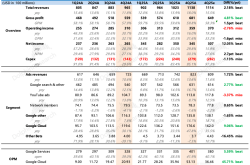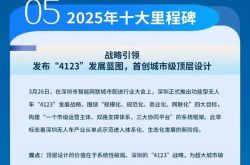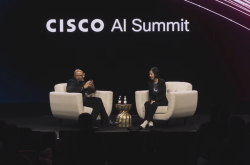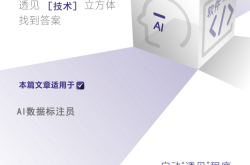"Cult Leader of Leather Jackets" Jen-Hsun Huang Unwavering in Pursuit of China's AI Feast
![]() 07/24 2025
07/24 2025
![]() 602
602
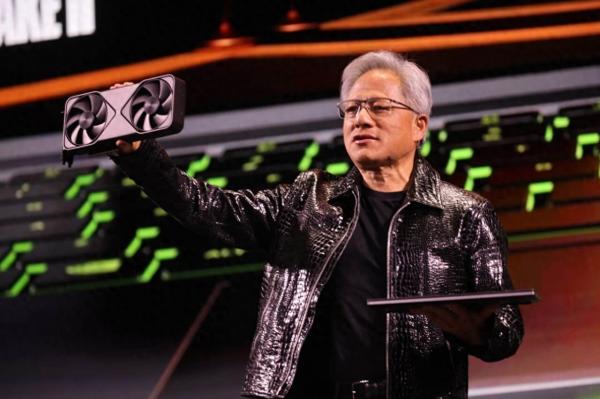
Nvidia CEO Jen-Hsun Huang once again ventured into China, stirring up a whirlwind of "Nvidia" enthusiasm. From Xiaomi to Huawei, and to Deepseek, he showered praise on nearly all of China's related AI industries. During an exclusive interview with CCTV News, spanning nearly 40 minutes, Huang actively sang high praise for Chinese enterprises and technology, while also discussing Nvidia's efforts in this market.
Upon summarizing Huang's recent visit to China, it becomes evident that this trip was aimed at paving the way for Nvidia to tap into China's vast market, thereby maintaining its market edge in the smart chip domain. Huang's subsequent remarks further substantiated this viewpoint. He remarked, "Being a CEO is no bed of roses. The pressure is always on. For 33 years, every day, every minute, I've lived under its weight. Every second, I've felt the responsibility of the company, customers, and the market. This pressure never lets up, not even for a moment."
Perhaps it is this sense of urgency that fuels Jen-Hsun Huang's optimism about China's expansive AI market, driving him to strive for new growth opportunities for Nvidia. As Huang noted, "Firstly, China boasts a highly developed supply chain, with overall infrastructure improvements, mature ecosystems, advanced technology, and massive manufacturing scale, which have left a profound impression on me. Secondly, this year's exhibitors encapsulate the global technology ecosystem, fully reflecting the high interdependence of the global supply chain."
Additionally, Huang lauded Chinese automakers such as Xiaomi, NIO, and Xpeng, hailing Chinese electric vehicles as a global sensation and stating that companies like Xiaomi are reshaping the global competitive landscape. Regarding Huawei, Huang acknowledged the company's significant breakthroughs in chips, network solutions, photonic technology, and other areas, making it a worthy model of learning.
Many attribute Huang's high EQ to the various signs he exhibited during his recent China trip. However, there's more to it. If we delve into the underlying reasons behind Huang's actions during this trip, China's vast and resilient AI market emerges as the key to his effusive praise.
China's AI Market: Exceptionally Vast
On July 21, the China Internet Network Information Center (CNNIC) released the 56th Statistical Report on Internet Development in China in Beijing. The report revealed that in 2024, China's AI industry scale surpassed 700 billion yuan, maintaining a growth rate of over 20% consecutively for several years. In the first half of 2025, generative AI products witnessed comprehensive progress from technology to application, with the number of products growing rapidly and application scenarios continuously expanding.
Huang also holds his own perspective on China's expansive AI market. In an interview this May, he predicted that by 2026, China's AI market size would reach $50 billion. In the coming years, China will continue to present immense opportunities for Nvidia. Perhaps based on this assessment, Huang has always regarded the Chinese market as Nvidia's primary focus. This time, Huang's return to China reaffirms this stance.
One of the primary reasons for China's vast AI market is its broad user base and diverse application scenarios. From the user base perspective, Deepseek's popularity offers a glimpse. Within less than 20 days of its launch, DeepSeek's global daily active users exceeded 30 million, topping app markets in 140 countries and regions worldwide, becoming the fastest-growing generative AI application globally. This phenomenon underscores that China's relatively extensive AI market user base is the true catalyst for its rapid development.
Besides the broad user base, the rich and varied application scenarios in China's AI market have also opened up new horizons for AI. On the consumer front, as of June, the proportion of users utilizing generative AI products to answer questions was the highest, reaching 80.9%. On the business front, in 2024, China's AI industry scale surpassed 700 billion yuan, maintaining a growth rate of over 20% consecutively for several years. Domestic AI products have not only achieved breakthroughs in parameter scales of hundreds of billions and multimodal capabilities but have also deeply integrated with scenarios such as office collaboration, affordable education, industrial design, and content creation, fostering an intelligent application ecosystem spanning multiple fields.
From this perspective, it's no surprise why Huang is so optimistic about the Chinese market. It can be argued that only by deeply integrating with the Chinese market and genuinely participating in the new wave of changes in China's AI industry can Nvidia, under Huang's leadership, truly capitalize on the new AI dividends.
China's AI Market: Full of Resilience
If China's expansive AI market size allows Huang to foresee business opportunities, then the market's characteristics, embodying both "software" and "hardware," make it impossible to overlook. Besides Huang, Zuckerberg's Meta's super AI team was also recently exposed.
On July 1 this year, Meta CEO Mark Zuckerberg announced the reorganization of the company's AI department, establishing the Super Intelligence Lab, which will focus on developing "super intelligence" AI systems capable of matching or even surpassing human abilities. According to the latest revelations from Silicon Valley VC mogul Deedy, he obtained a detailed employee list of the "Super Intelligence Lab" from an anonymous Meta employee. Currently, 50% of the lab's 44 employees are of Chinese origin; 75% are first-generation immigrants; and 75% hold Ph.D. degrees. The annual salaries of these members are expected to range from $10 million to $100 million.
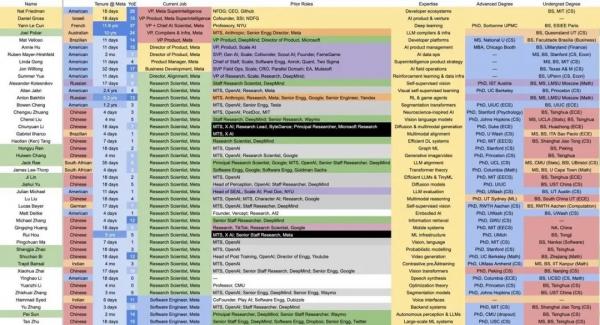
Analyzing the national origins of the 44 employees listed, 21 are marked as Chinese, and 5 Americans with Chinese surnames are suspected to be Chinese Americans.
Zuckerberg's Super Intelligence Lab is merely one example. OpenAI also boasts the presence of Chinese talent. After OpenAI released its most powerful model GPT-4o, key team members of GPT-4o were exposed. Among the 17 team members, 6 are Chinese, with their undergraduate degrees from prestigious institutions like Tsinghua University, Peking University, Shanghai Jiao Tong University, and University of Science and Technology of China.
According to the "Global AI Talent Tracking Report," in 2022, AI researchers (based on undergraduate degrees) from the United States and China accounted for 75% of top AI talent (top 20%) in US institutions.
Beyond China's vast talent pool, another "software" aspect is the pervasive application of large models. According to the 56th Statistical Report on Internet Development in China released by CNNIC, as of March, a total of 346 generative AI services had been filed with the State Internet Information Office. Alibaba's Tongyi Qianwen, Tencent's Yuanbao large model, Baidu's ERNIE Bot large model, and numerous other large models are continually enriching the "soft power" in the Chinese market.
As the "software" starts to demonstrate robust advantages, China's AI market has also showcased a very resilient side in "hardware." In May 2025, Huang mentioned that four years ago, Nvidia's market share in China was as high as 95%, but now it stands at only 50%. What does this signify? It indicates that China's indigenous chips are on the rise.
According to IDC data, in 2024, the penetration rate of Chinese local AI chip brands was approximately 30%, with shipments reaching 820,000 units, marking a significant increase compared to the 15% penetration rate of domestic brands in the same period last year. AI "hardware" suppliers, represented by chip companies such as Huawei Hisilicon, Cambricon, and Kunlunxin, are continually enriching and improving the "hard power" in China's AI market. According to Frost & Sullivan's forecast, China's AI chip market size will surge from 142.537 billion yuan in 2024 to 1.34 trillion yuan in 2029, with an average annual compound growth rate of 53.7% from 2025 to 2029.
A steady influx of AI talents and the continuous launch of AI large models provide "soft power" for China's AI market, while the emerging AI chip vendors offer robust "hard support." When China's AI market encompasses both "soft power" and "hard power," it undoubtedly becomes a market brimming with resilience.
Precisely because of this, we observe that Huang attaches great importance to the Chinese market. On July 15, Jen-Hsun Huang, the founder and CEO of Nvidia, announced during his visit to China that the supply of the China-specific H20 chip would be resumed. Concurrently, another AI chip giant, AMD, also expressed hope for resuming sales in China. This clearly illustrates that China's AI market, with its demonstrated strong resilience, is attracting the attention of more and more players.
Conclusion
As Huang noted in an interview, China leads the world in AI models, engineering talents, and industrial applications. Perhaps this is the fundamental reason behind his optimism about China's AI market. With its vast and diverse market, coupled with "soft and hard" supporting facilities, China's dominance in the global AI market is no longer a surprise. Huang made the right choice, and I believe he won't be the last. China's AI market will continue to attract more players to join and partake in this feast.

